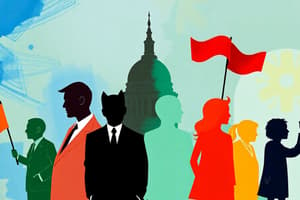Podcast
Questions and Answers
What is democracy?
What is democracy?
Democracy is a system of government in which state power is vested in the people or the general population of a state.
What is the difference between direct democracy and representative democracy?
What is the difference between direct democracy and representative democracy?
In a direct democracy, the people have the direct authority to deliberate and decide legislation. In a representative democracy, the people choose governing officials through elections to do so.
According to the United Nations, what does democracy provide?
According to the United Nations, what does democracy provide?
According to the United Nations, democracy provides an environment that respects human rights and fundamental freedoms, and in which the freely expressed will of people is exercised.
What are some features of democracy?
What are some features of democracy?
How has the concept of 'the people' and the delegation of authority changed over time and across countries?
How has the concept of 'the people' and the delegation of authority changed over time and across countries?
Flashcards are hidden until you start studying
Study Notes
Democracy
- Democracy is a system of government where power is held directly by citizens or through elected representatives.
Types of Democracy
- Direct Democracy: Citizens make decisions directly, often through votes on laws and policies.
- Representative Democracy: Citizens elect representatives to make decisions on their behalf.
United Nations and Democracy
- According to the United Nations, democracy provides equal rights and opportunities for all citizens to participate in the decision-making process.
Features of Democracy
- Free and Fair Elections: Regular elections where citizens can choose their representatives.
- Active Participation: Citizens participate in the decision-making process through voting, protests, and public debates.
- Protection of Human Rights: Democracy ensures the protection of individual rights and freedoms.
- Separation of Powers: Division of power among legislative, executive, and judicial branches to prevent abuse of power.
- Transparency and Accountability: Government actions and decisions are open to public scrutiny and critique.
Evolution of Democracy
- The concept of 'the people' has expanded over time to include more citizens, such as women and minorities, who have gained the right to participate in the democratic process.
- The delegation of authority has shifted from monarchies and aristocracies to elected representatives and democratic institutions across countries and history.
Studying That Suits You
Use AI to generate personalized quizzes and flashcards to suit your learning preferences.




